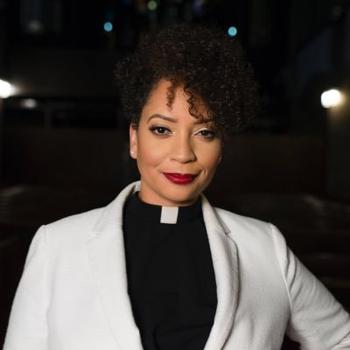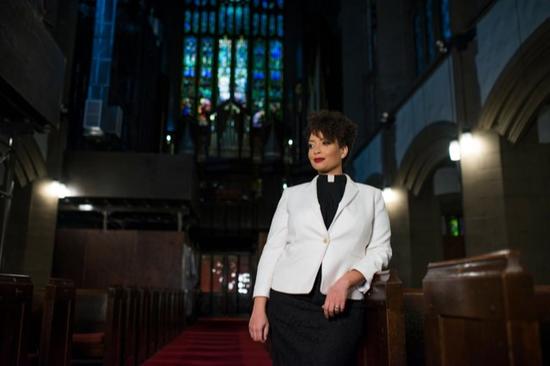Kaji Douša ’06 M.Div. is Senior Pastor at Park Avenue Christian Church in New York—the first woman called to this role at the 206-year-old congregation—and the new President of the YDS Alumni Association Board. YDS sat down with her to discuss her volunteer leadership role as well as larger affairs affecting the church and world.
Congratulations on your election as President of the YDS Alumni Board. What motivates your continued volunteer service at your divinity alma mater?
 Thank you! I think that the thing that keeps bringing me back to YDS—whether for Convocation, lectures, panels, or board service— is this overwhelming sense of gratitude. I came as a student with a strong but unclear call to serve, and YDS gave me clarity, grounding, and skills. I’m highly invested in who YDS graduates and their capacities to serve a world in need of inspiring leaders who can help to build compassion, meaningful connection, and creative responses to the world’s needs. To the degree that I can help hone and support that process, I’m here.
Thank you! I think that the thing that keeps bringing me back to YDS—whether for Convocation, lectures, panels, or board service— is this overwhelming sense of gratitude. I came as a student with a strong but unclear call to serve, and YDS gave me clarity, grounding, and skills. I’m highly invested in who YDS graduates and their capacities to serve a world in need of inspiring leaders who can help to build compassion, meaningful connection, and creative responses to the world’s needs. To the degree that I can help hone and support that process, I’m here.
How do you assess YDS today and what are your top priorities in representing a diverse community of more than 8,000 alumni/ae?
When I learned about the Divinity School’s bold pivot points—particularly related to financial support for students—I was sold. Students’ crippling financial debt can limit their freedom. My top priority is always liberation. So freedom from debt—incurred either for tuition or for the life required to live here—is very important to me. I want to help the School to help alumnae/i find our way in supporting this crucial shift in how theological education is funded.
Related to liberation are my interests in seeing what YDS can do in this day and in this time to end white supremacy and its adjacent sins. This will mean that we prepare ourselves to engage in lifelong individual and collective practices of discernment, examination, and repentance. It will mean preparing leadership that cares about humans as such and has creative ideas about how to extend privilege and end racism. It will mean an embrace of a future orientation that is very difficult to imagine. Obviously, this is incredibly complex and difficult work, especially from and at Yale. But I believe that the School might just be up for components of the task. It needs to be because the world needs to be liberated from its deepest sins. If theologically trained people will not be major players in this work, exactly who will? Alumnae/i have lifelong expertise and learning needs in this area. Connecting us to those possibilities seems to fit into the School’s pivot points on diversity and to mine, personally.
Turning our focus from YDS to the wider world, we can see much divisiveness in society and an unmistakable sense of fear and anger. Why do you these negative emotions have such a hold on the culture today?
Here’s what my congregation, the Park Avenue Christian Church says about this on our website:
“In a world of growing anger, we need to rediscover a little beauty, a generous measure of hope, and a lot of love. Church gives people a chance to step aside from the noise of the city so that we can heal the mind and spirit and arise ready to serve and change the world.”
I don’t have great measures about how angry we were before. (I’m not sure I even know who “we” are.) But I do know that when we face this, and any emotion with which we might struggle to know what to do, we need … Space. Beauty. Hope. Love. Resurrection.
I really appreciate the Spring 2018 issue of Reflections that addressed the issues of unity in this time of divisiveness. (Shout out to Ray Waddle who does such wonderful editorial work!) In that issue, here’s something I contributed:
Many of us have heard: “In essentials unity, in nonessentials liberty, in all things charity.” If this hopeful declaration is to do more than continue status quo sin and injustice, then we need to redefine how we imagine unity, liberty, and charity. God is counting on us to do better—and build an imagination that holds fast to the eschatological promise of the Oneness God intends for us. What this means is that this Oneness is not going to involve making the dominant more comfortable, in society or in church. It will mean the same kind of radical transformation many of us invite into our lives during, say, Lent, involving prayer, fasting, and almsgiving. Freedom from our sin will mean giving up quite a bit while we gain … everything.
What are YDS alumni/ae uniquely prepared and able to contribute to fostering trust and flourishing in our culture?
 I believe that the people I will trust most are the ones who are willing to see me and realize that, in the seeing, something about them might have to change. The same is true for me.
I believe that the people I will trust most are the ones who are willing to see me and realize that, in the seeing, something about them might have to change. The same is true for me.
I have learned how to do this, inherently, in giving up portions of myself in spaces of dominance that were never designed for my perspective.
When we can pull this off—no matter what we bring to the conversation—I think that the other side has a sense of safety we might not feel otherwise. The question, from a pedagogical perspective, becomes: Whose burden is this work? From my perspectives of privilege—of which I hold many? Yes, I can share in the initiation of this work. But from the places where I am most vulnerable? This is not my work. Helping us all to see our place in this calculus is difficult but important.
Much has been written about religious disaffiliation in America and the Western world. How can churches (and seminaries and divinity schools) best respond?
It is so easy to be attacked for what we believe. This can cause us to say nothing at all. But we can just as easily be caught in moments of dispossession and despair, wondering where we are, who we are, and what we believe.
In short: There is no easy way. There is no real way to avoid the tough talks or the conflict that we don’t feel prepared to address.
What we do, instead, is realize that it’s not all on us. Maybe we find a community that’s versed in sharing burdens. Perhaps we explore sacred texts that help us to see our place situated amongst and accountable to the many. In this critical work, there are no shortcuts. But there are places of refuge, respite, inspiration, and resurrection. Easter is now.
The way I see it? We may not claim our rebirth as church. But church will know us and our experience, nonetheless. Institutional relevance is in building in those practices of recognizing our own.